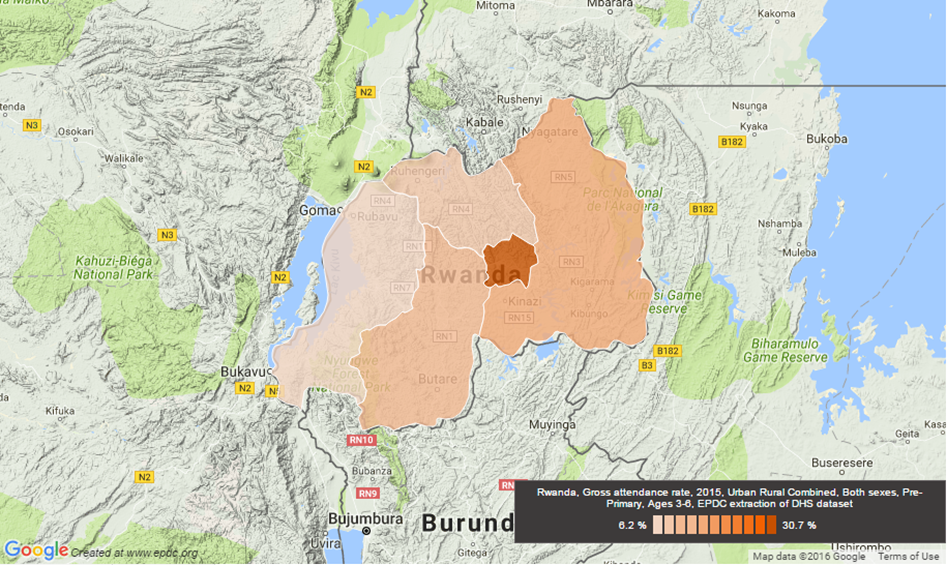You are here
Starting Early for Equity in Education: The case of Rwanda
Nguyen Thi Thanh Huyen (PhD Candidate, Kobe University and Intern, EPDC); Hibatallah Ibrahim (Intern, EPDC); and Charles Gale (Research Associate, EPDC)
In recent weeks, EPDC has been focused on updating its database with the most recent disaggregated data on education. In addition to updating our collection of administrative data, we have also added data from additional DHS and MICS surveys. Chad, Lesotho, Rwanda, Algeria, Thailand, Uruguay and Laos are now represented in the EPDC database with their most recent household survey data from these sources. In this post, we feature the Rwanda data to highlight some trends in early childhood education in the country.
With the conclusion of Education for All, it is a good time to reflect on how national and international priorities have changed in regards to education policy and programming. As discussed in a previous post, pre-primary education has seen increased monitoring by national governments in recent years. Following strategy No. 11 of Dakar Framework for Action that urged countries to systematically monitor progress towards EFA goals, many low income countries made commitments to promoting and closely monitoring early childhood care and education (ECCE) or early childhood development (ECD) in achieving EFA Goal 1.
The DHS data from Rwanda provide an updated snapshot of education in the country at all schooling levels, and is important in providing disaggregation not only to the sub-national level, geographical category (rural/urban) and gender, but also for household wealth quintiles. Pre-primary education or early childhood development (ECD)[1] in Rwanda is defined as a range of processes and mechanisms by which children before the age of 6 grow and thrive physically, mentally, emotionally, morally and socially. According to the EFA Action Plan report for Rwanda, in 2000 fewer than 1% of pre-primary aged children (18,399 out of around two million children) attended pre-primary centers. Most of these children were from rich families whose parents could afford to pay fees; only 2 out of 257 pre-primary centers at that time were government-owned.
With the government’s commitments to achieve EFA goals by 2015, greater attention has been paid to improving school readiness for young children. The most recent DHS data for Rwanda (2015) show a massive growth in attendance rates for pre-primary education, compared to 2000. Although the growth of ECE continues to favor urban areas, it is clear that there have been increases in all regions throughout the country (Figure 1). According the EFA Action Plan, in 2000 pre-primary centers were concentrated almost solely in urban areas, but by 2015, pre-primary centers have proliferated in number. While there is almost no difference between the south and the east, it is observed that the smallest number of children enrolled are in the west of the country.
Figure 1 - Map showing high and low Gross Attendance Rates in pre-primary, Rwanda (2015)
The disparity between regions may be partly explained by differences in regional socio-economic development. The EFA report notes, for example, that higher levels of poverty are found in Western districts. More clearly however, data show national level disparities by household wealth quintile. The gross attendance rate in pre-primary education also appears to be positively associated with an increase in household wealth, as shown in Figure 2. The rate for children from the richest households is nearly twice as high as those from the next richest wealth quintile and nearly four times as high as those from the poorest households. Other equity dimensions included in the graph are gender and urban/rural. One can see that gross attendance rates are higher for female students and those living in urban areas.
Figure 2 - Bar graph showing Gross Attendance Rates in pre-primary by equity dimension, Rwanda (2015)
.png)
Despite all of the mentioned issues addressing equity in education focusing on early childhood education, it can be summarized that the Rwandan government has paid a strong commitment to monitoring education access for pre-primary education in order to achieve education for all. In addition, it is also undeniable that access to pre-primary has improved throughout the last decade, with corresponding improvements in equity. Rwanda is one country leading the way in terms of access to early childhood education among countries in Sub Saharan Africa.
Related links:
Education Policy and Data Center (EPDC Data) page
[1] In Rwanda the term Early Childhood Development (ECD) is used with the same meaning as Early Childhood Care and Education (ECCE) that is often used by UNESCO.


Comments
Updated graph
Add new comment